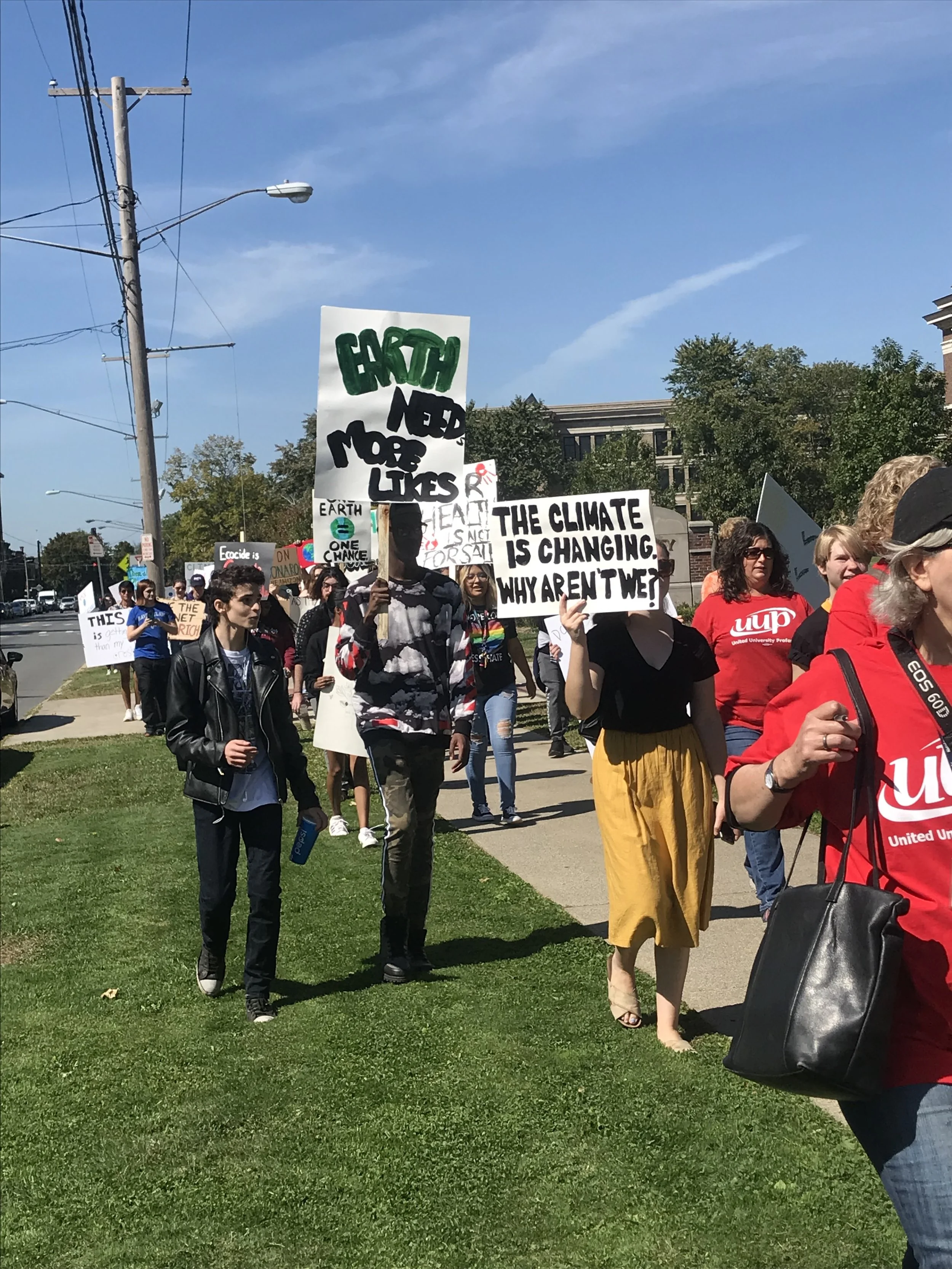UAlbany students join global climate strike
(September 24, 2019 – Albany Student Press)
By Matthew Mirro
On Friday, hundreds of students and activists from throughout the Capital Region
converged on West Capital Park to protest and bring awareness to one giant issue: climate
change. The event was part of the Global Climate Strike, an international effort of similar rallies
and marches created to, by skipping classes and work, disrupt the norm of the usual Friday
workday.
In Albany and around the world the message was loud and clear: climate change is an
existential crisis and we aren’t doing enough.
“I’m here to tell our politicians that young students and people care about climate change
and we want something done about it,” said Madeleine Wadeson, a freshman political science
major from Warwick, NY who skipped class herself to be there.
Organized by the United Nations Association of America (UNUSA), the UAlbany
Students for Sustainability, the UAlbany Peace Action, the Albany branch of the Sunrise
Movement and the Albany Climate Strike group, protestors trickled into the grounds outside
Page Hall in the downtown campus where many took the time to prepare banners and signs.
From there, after a speech from UAlbany senior and environmental activist, Grace McGrath, the
growing group, which by then included a contingent from Saint Rose, flooded the quiet capital
streets.
“We’re sending out a message to all people,” UNUSA President Benitha Muyizere, a
junior from Rwanda, told the ASP. “It’s more of a climate action advocacy. We have proposed
ideas that we will be sending to the mayor [Kathy Sheehan] and we hope they can be adopted as
soon as possible because the Earth is dying and we are going to save it has to be now”.
Through rhythmic chants, laughter, car horns in both support and derision (but mostly the
former) and lots of filming from onlookers, the marchers arrived at the park in the shadow of the
New York State capital building. UAlbany students were soon joined by other organizations
from around the city including protestors from Albany High School.
Early on, students were asked to stand behind the microphones as UAlbany student
organizer Audrea Din addressed both the audience and the surrounding political temples made
small by the throngs of people. She and other student leaders from the area denounced world
leaders for failing to address climate change, especially decrying the rollback of 53
environmental laws and counting under the Trump Administration. They discussed the
disproportionate effects of the worsening climate issue on traditionally underserved communities
and demanded to have their voices heard.
The next five minutes were spent in total silence, on the ground. The mass of protestors
laid on their backs for what was dubbed a “Die-In”. It gave the eerie appearance of a mass of
dead bodies on the capital lawn. And on a hot late September day, the message scene seemed all
too believable.
“We are here to show the people in Washington and New York State lawmakers that
something needs to be done,” said Grace McGrath. “We’re the ones that are going to be dealing
with this in the future. They aren’t. So it’s important for us to stand up and speak out.
As the march and rally wound down to a peace concert with ageless cover songs of
change and triumph written by Bob Dylan, I looked around and took stock of what I had just
witnessed. It had occurred all around the world, in Washington D.C. and New York City, in
Berlin, London and Australia, so on and so forth. I saw little kids climbing statues to get a better
look at the crowd and their parents making sure they paid attention. I saw older people crying,
their tears matched by students as well. I saw people trying to make change, demanding, not
asking, that they be heard and they be taken seriously.
They came from all over. From UAlbany and Saint Rose to offices and street stores, from
Long Island and Buffalo to New Jersey, Chicago and Rwanda. They came with drums, horns,
guitars, banners and signs. They came with demands and they came with hope. But above all,
what mattered was that they came at all.
